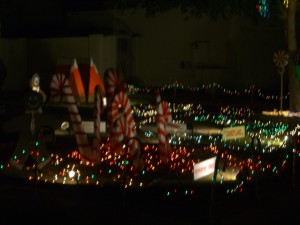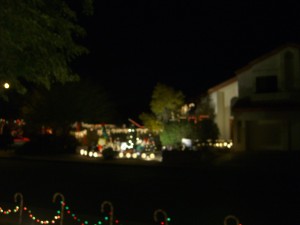From her Grandfather (who was in the US Navy and a Marine):
Red in the morning, sailors warning
Red in the evening, Sailors leaving.
Notes:
The informant told me that this was a popular saying her grandfather told her. She said that he was in the Navy and the Marines and attributed this saying to those organizations. I asked her what she thought it meant and she told me that it as a weather indicator, meaning if the sky was red in the morning than bad weather was ahead, and if the sky was red at night, clear skies were ahead. She was not sure why it mentioned sailors leaving, even though it was meant to say good weather.
I have heard this proverb before but in a different form. I heard, Red in the morning, sailors warning/ Red in the night, sailors delight. This variant makes a little more sense in regard to the weather indicator, since delight makes more of a reference to having good weather than leaving does. I decided to look this proverb up for why red is the indicator, and if there is some scienitific explanation behind it. I found a website entitled, The Phrase Finder which dedicates itself to finding the reasons behind certain phrases and possible past references. First of all it cites this saying with shepherds rather than sailors, saying that it was also a popular phrase for farmers in the UK. It believes its origin comes form the Wyclif Bible in 1395. It cites the translated version, When it is evening, ye say, It will be fair weather: for the sky is red. And in the morning, It will be foul weather to day: for the sky is red and louring” (The Phrase Finder). This quote directly relates red morning meaning bad weather for the rest of the day. Another past reference that it cites is in Shakespeares Venus and Adonis (1593), Like a red morn, that ever yet betoken’d wreck to the seaman – sorrow to shepherds” (The Phrase Finder). This line also makes reference to red mornings as bad weather indicators, and it directly mentions shepherds. It is clear that this saying is quite old and most likely originated in the UK. The reason why red is the indicator of bad weather is because if the clouds are broken and red light is reflected back towards the people, then there is a chance of rain, compared to a cloudless sky (The Phrase Finder). The reason why a red sky in the evening is an indicator of good weather is because the clouds have already passed and therefore the storm has passed and good weather is ahead (The Phrase Finder).
I think that this saying is used in the Navy and the Marines because they are out on sea and it is an easy indicator of how the weather will be the next day, so that they can better prepare for their activities. Obviously the informant was right that the saying is a weather indicator. However her version is a little different, which is evidence that it is a variant from the many other versions cited on the website.
http://www.phrases.org.uk/meanings/red-sky-at-night.html Apr 20 2007


